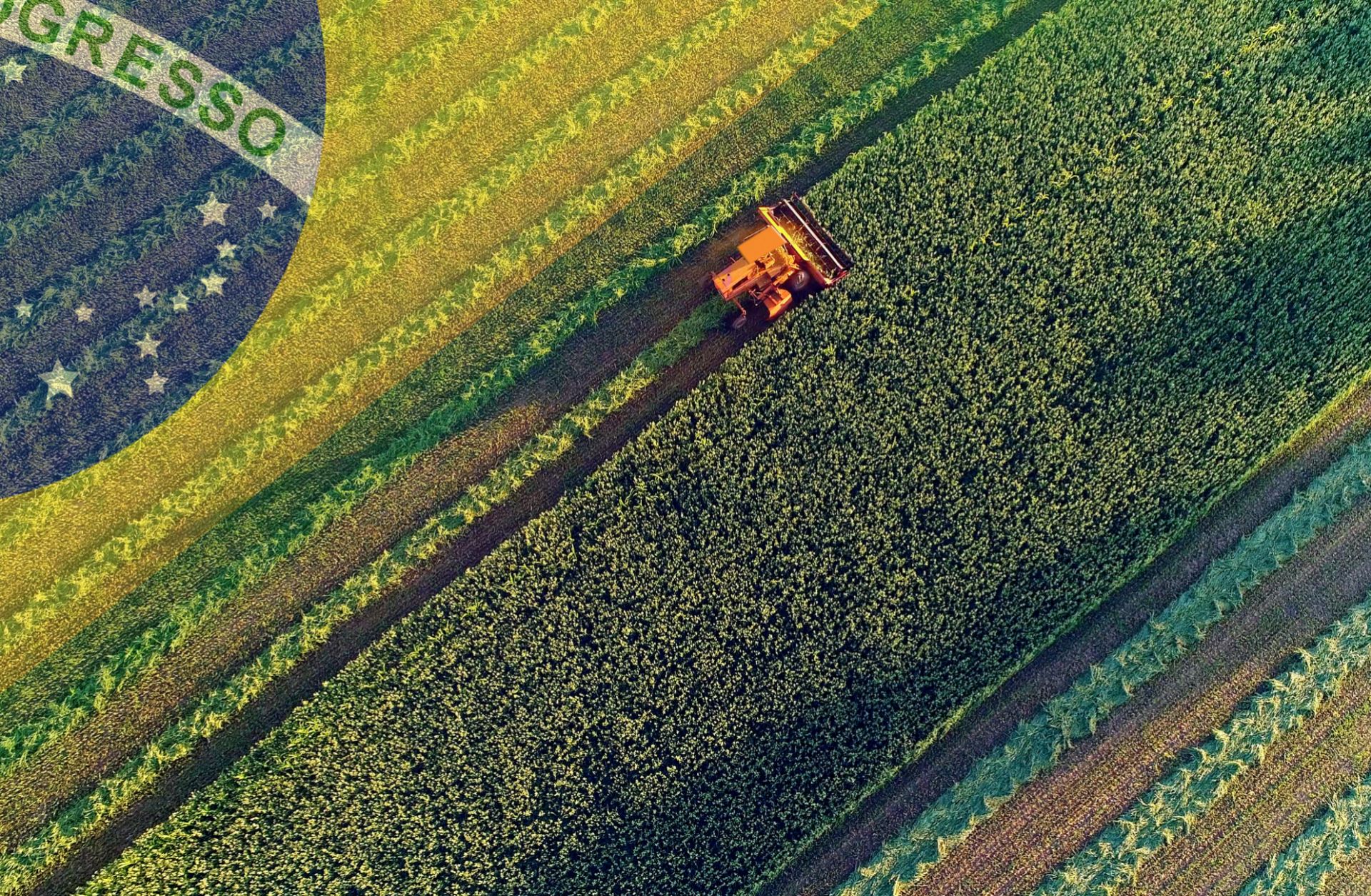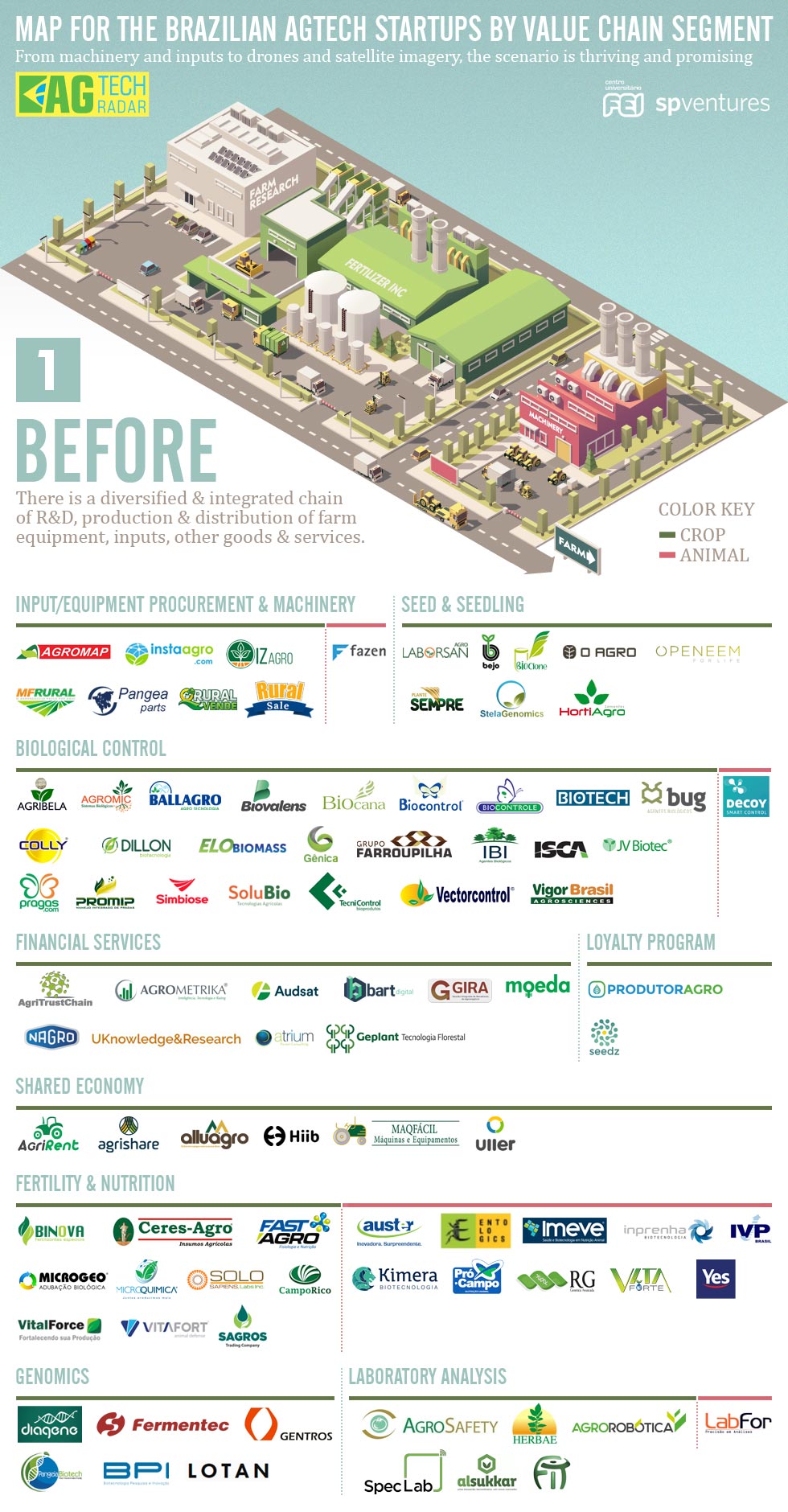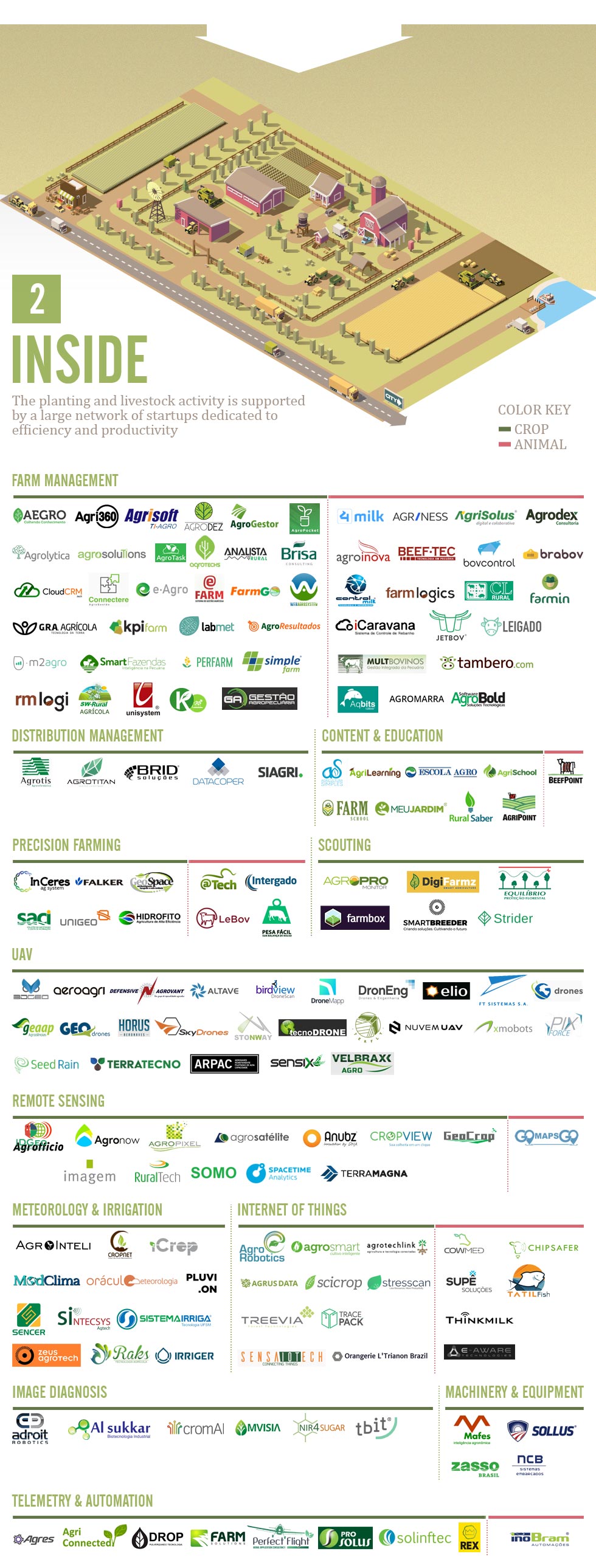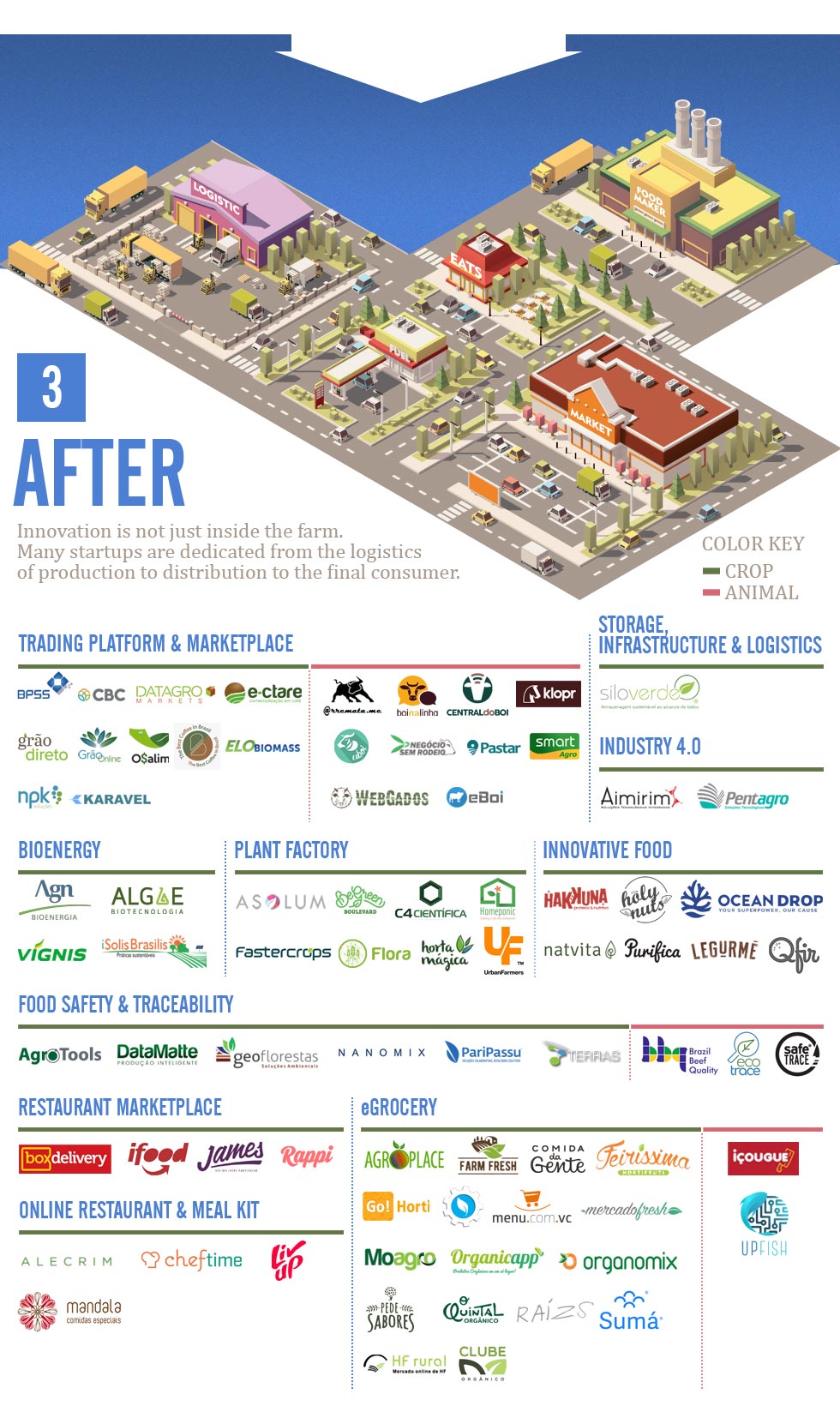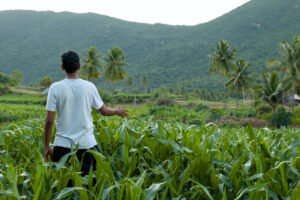Editor’s Note: Francisco Jardim is founding partner of Brazilian agtech venture capital firm SP Ventures. Working with Centro Universitário FEI, and with the help of his colleagues, Agtech Garage, Pulse, Usina, Esalqtec, and Agrihub, here Jardim presents the Brazil Agtech Market Map and offers insights into the growth of Brazil’s agtech startup ecosystem.
Over the past few decades, Brazil has gone from a net importer of food to an agriculture powerhouse. It has overtaken Australia and Canada to position itself as the second largest agricultural exporter on the planet. The South American nation is the world’s leading producer of orange juice, coffee and sugar and second in soybean, ethanol, and beef.
When it comes to exports, Brazil leads the pack in soybeans, beef, poultry, coffee, sugar, ethanol, orange juice and comes second in corn. Brazil is also one of the top five producers and exporters of cotton, pork, and cacao. It is safe to say that the locomotive of Brazil is agribusiness. It is the most dynamic engine of the economy and accounts for roughly 50% of the country’s exports and 23% of GDP. The sector has become so globally integrated and important to the domestic economy that it turned itself immune to the region´s economic and political volatilities; while Brazil faced one of its worst recessions, seeing GDP shrink by more than 3.3% in 2016, agribusiness GDP expanded by more than 3%.
Brazil’s success in ag
The success of Brazil’s ag sector has often be attributed to rampant government support and deforestation of the Amazon, this couldn’t be further from the truth: historically, state support for agriculture in Brazil has ranged from 5-7% of total farm income, compared with 10-12% in the US, 25-30% in the EU, and a 25-26% average in OECD countries; and with core agricultural growth taking place 1,000 km from the rainforest, the Amazon has been left relatively untouched.
Scientific and technological breakthroughs have also contributed to this success. EMBRAPA (Brazilian Agricultural Research Corp), established in 1973 by the government, is the largest tropical agriculture research institute in the world and has developed hundreds of innovations for Brazilian farmers. But perhaps its single most important contribution was the epic transformation of Brazil’s semi-arid Cerrado region from unfarmable land to the world´s new breadbasket. This involved the mass application of lime and the breeding of rhizobium bacteria to reduce soil acidity and fix nitrogen. EMBRAPA has also taken a lead in biotechnology by genetically improving brachiaria grass and the soybean plant, making both highly suitable to the semi-arid region. Together this enabled the region’s large-scale livestock and grain production operations today.
Another important research institution for Brazil’s agriculture industry is the University of São Paulo´s prestigious Escola Superior de Agricultura Luiz de Queiroz (ESALQ). The school has been consistently ranked as one of the top five agrarian sciences universities in the world, together with Wageningen in the Netherlands), UC Davis & Cornell in the US and the China Agricultural University. ESALQ has helped transform the city of Piracicaba, in Sao Paolo state, into the Menlo Park of the Brazilian agtech ecosystem, which stands to become one of the world’s most exciting agtech ecosystems.
Brazil’s agtech ecosystem
Piracicaba is a key pillar of Brazil’s agtech ecosystem.
Raízen, the largest sugar and ethanol group in the world, founded in the city´s river valley in 1936, teamed up with Argentinian accelerator platform NXTP Labs and SP Ventures to launch an agtech accelerator called Pulse based in the city. Pulse is currently embarking on its second cohort of startups after a highly successful first round.
The town also boasts a science park and a startup incubator — inside ESALQ — both inhabited primarily by agtech companies. In the heart of the downtown lies the AgTech Garage, perhaps the most important agtech hub and think tank in Latin America.
The improving technological infrastructure of Brazil, such as connectivity, mobile penetration, satellite imagery, and digital literacy, has been key to developing the country’s agtech ecosystem, enabling businesses to bring new products and solutions to Brazilian farmers in a cost-efficient manner. Between 2012 and 2017, smartphone penetration increased from 16% to over 70%.
Another key pillar of Brazil’s agtech ecosystem is the wide range of participants. The ecosystem is populated with native tech firms founded by well-networked entrepreneurs, with a keen understanding of local culture, infrastructure, and agronomic peculiarities, tackling the regions core problems. Building a company has become a top career option for many of the brightest minds. The investor community interested in this industry is growing too, which we will address in a later article.
At SP Ventures, we screened 54 agtech startups between 2007 and 2014. But between 2015 and February 2018, we had screened over 400. Not only has dealflow growth been explosive, but quality has improved significantly along with the talent pool.
The agtech startup landscape can be divided into three macro segments depending on where in the agricultural supply chain the startups operate.
2018 Brazil Agtech Market Map:
1. Before The Farm
An integrated network of agtech startups including inputs manufacturers (i.e. seeds, beneficial insects, microbes, fertilizers and plant nutrition), digital procurement and frontier diagnostics (i.e. genomics, etc.), equipment sharing platforms, and the intersection of fintech with agtech, where capital is a basic input for conducting farming activities.
Key Examples:
- Promip – a spin-off from ESALQ´s Entymology department, this startup has the largest product portfolio in the Brazilian macrobiological market and is venture backed by ESALQTEC & SP Ventures
- BartDigital – employs blockchain technology to dematerialize and disrupt Brazil’s ag barter debt market, worth over $50 billion annually, and backed by Brazillian accelerator Startup Farm and SP Ventures.
2. Inside The Farm
This includes farm management software, mass education platforms, scouting and pest monitoring platforms, remote sensing and image data processing (i.e. IoT, Drones, etc.), equipment and machinery.
Key Examples:
- InCeres – a soil fertility cloud processing firm, with over five million hectares in primary data, evolved to lead a data science revolution integrating the fertilizer supply chain, and venture backed by Tech Farmers Fund, Ag Angel Syndicate & SP Ventures.
- Solinftec – the dominating IoT platform in the sugarcane industry, integrating and digitalizing all aspects of the farming operation, currently evolving to an AI platform called Alice and venture backed by TPG ART and AgFunder.
- Aegro – the leading farm management system in Brazil, integrated with proprietary pest monitoring scouting and, venture backed by WOW Ventures, ABSEED Ventures & SP Ventures.
- Horus Aeronaves – the first drone-as-a-service company working in LATAM, based on a proprietary solution for analysis of high-resolution field imagery, building up a network of authorized operators spread all over Brazil, and venture backed by Darwin Accelerator (CVentures) & SP Ventures.
3. After The Farm
As food leaves the farm, a vast network of distribution and trading, processing, energy, traceability and food assurance, storage and monitoring, restaurant marketplace and food innovations matching new consumer demands.
Key Examples:

